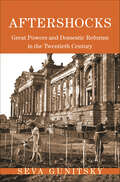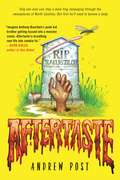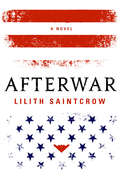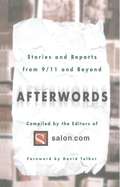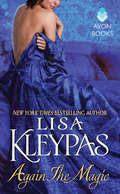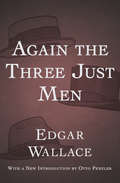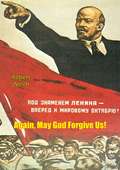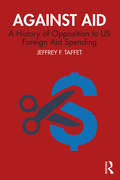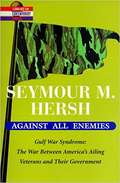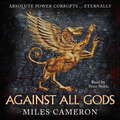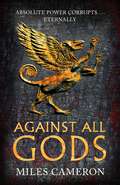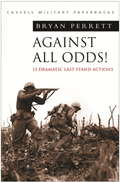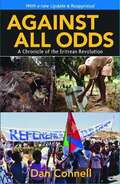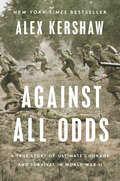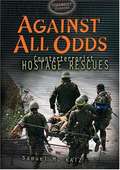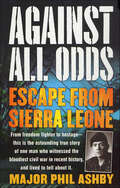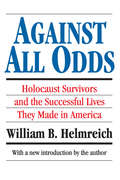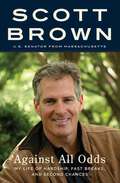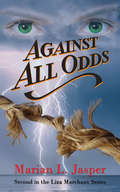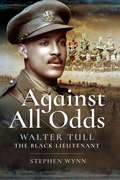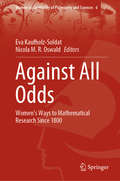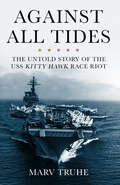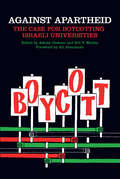- Table View
- List View
Aftershocks: Great Powers and Domestic Reforms in the Twentieth Century (Princeton Studies in International History and Politics)
by Seva GunitskyOver the past century, democracy spread around the world in turbulent bursts of change, sweeping across national borders in dramatic cascades of revolution and reform. Aftershocks offers a new global-oriented explanation for this wavelike spread and retreat—not only of democracy but also of its twentieth-century rivals, fascism and communism.Seva Gunitsky argues that waves of regime change are driven by the aftermath of cataclysmic disruptions to the international system. These hegemonic shocks, marked by the sudden rise and fall of great powers, have been essential and often-neglected drivers of domestic transformations. Though rare and fleeting, they not only repeatedly alter the global hierarchy of powerful states but also create unique and powerful opportunities for sweeping national reforms—by triggering military impositions, swiftly changing the incentives of domestic actors, or transforming the basis of political legitimacy itself. As a result, the evolution of modern regimes cannot be fully understood without examining the consequences of clashes between great powers, which repeatedly—and often unsuccessfully—sought to cajole, inspire, and intimidate other states into joining their camps.
Aftertaste
by Andrew PostAn undead monster hunter must track down a killer, trailer-park-havoc-wreaking were-frog in this outrageous mash-up of Jim Butcher’s urban fantasy and George Romero’s zombie horror.Before he died, Saelig Zilch was a chef. Now, posthumously recruited by a shadowy agency for reasons still unknown, tasked with keeping the public safe from things that go bump in the night, he hunts monsters. Zilch scrabbles out of a North Carolina grave in someone else’s body. Someone recently dead. He only has a few days to find his bearings and carry out his latest mission, before the precious few nanobugs in his corpse shell are exhausted and he’s forced to start all over at the beginning. As he trudges down the main thoroughfare, he runs into Galavance. More accurately, she runs into him with her pink Chevy Cavalier.A case of unfortunate timing? Maybe not. Turns out the critter Zilch has been dispatched to dispatch of—a murderous were-frog—squelches uncomfortably close to the trailer Galavance calls home. And come to think of it, Galavance's boyfriend Jolby has been spending a lot of nights out lately . . .Stuffing gross-out humor, greasy fast food, and psychedelic amphibians into a blender on high, Aftertaste is a wild ride through life, afterlife, and the American South.
Afterwar
by Lilith SaintcrowAmerica has been devastated by a second civil war. The people have spent years divided, fighting their fellow patriots. Now, as the regime crumbles and the bloody conflict draws to a close, the work of rebuilding begins.One lonely crew, bonded under fire in the darkest days of battle, must complete one last mission: to secure a war criminal whose secrets could destroy the fragile peace that has just begun to form.Bestselling author Lilith Saintcrow presents a timely and all-too-realistic glimpse of a future that we hope never comes to pass.For more from Lilith Saintcrow, check out:Cormorant RunBlood Call Bannon and ClareThe Iron Wyrm AffairThe Red Plague AffairThe Ripper AffairThe Damnation Affair (e-only)Dante Valentine NovelsWorking for the DevilDead Man RisingDevil's Right HandSaint City SinnersTo Hell and BackDante Valentine (omnibus)Jill Kismet NovelsNight ShiftHunter's PrayerRedemption AlleyFlesh CircusHeaven's SpiteAngel TownJill Kismet (omnibus)A Romance of Arquitaine NovelsThe Hedgewitch QueenThe Bandit KingGallow and RaggedTrailer Park FaeRoadside MagicWasteland King
Afterwords: Stories and Reports from 9/11 and Beyond
by David TalbotAFTER September 11, 2001, emotions couldn't be clearly defined. There were no WORDS strong enough to justify, avenge, explain, or express the sheer magnitude of this horrifyingly unique moment in history. In this remarkable anthology, compiled by Salon.com's award-winning editorial team, Rick Moody, Janet Fitch, Caroline Knapp, and Jeffrey Eugenides join many contemporary literary talents and reporters in giving a voice to the day that left a stunning roar of silence across America. Dread, fear, heroism, and dignity color these pages from eyewitness accounts of ordinary citizens turned rescue workers, to an escape from the World Trade Center, a report on everyday New Yorkers finding comfort in "terror sex," and stories of miracles in the madness -- like that of a blind man led by his seeing-eye dog down eighty-seven flights of stairs to safety. Afterwords also probes the aftermath of the attacks on the nation and the world's cultural, political, and social fabric through writing ranging from an in-depth interview with controversial social critic Noam Chomsky, to a female Pakistani-American journalist's meeting with a Taliban leader and his wives, and essays on how sheer horror gave way to heartening solidarity, macabre spectacle, and kitschy sentimentality. Immediate, raw, emotional, and empowering, this outstanding collection speaks brilliantly to the simple need to remember and comprehend what happened against that perfect blue sky on September 11, 2001. A portion of the royalties will be donated to the Twin Towers Fund and the Red Cross's Fund for Afghan Children.
Again The Magic (Bride Series)
by Lisa KleypasShe gave him her innocence . . .Lady Aline Marsden was brought up to marry a man of her own class, but from the moment she meets John McKenna, she risks everything to be with him.He gave her his heartAlthough their love is forbidden, McKenna's passion for the beautiful Aline is too compelling to deny.When their secret is discovered, their world is shattered. McKenna is forced to leave forever, unaware that the only reason Aline has given him up is to save him.Now McKenna has returned, a powerful man determined to take revenge against the woman who broke his heart. But the magic between them burns as fiercely as ever . . . and as McKenna uncovers Aline's deepest secret, together they discover a love that will defy Fate itself.
Again the Three Just Men: Large Print (The Four Just Men #6)
by Edgar WallaceTen thrilling tales from the secret files of the world&’s most famous vigilantes An honest workingman tries to intimidate his wife&’s blackmailer and winds up in prison. Only the organization known as the Four Just Men can save him—by taking the law into their own hands. A noted professor is found strangled to death in his laboratory, and the prime suspect is his sinister-looking son. When Manfred and Gonsalez realize that the police have not only the wrong man, but the wrong murder method, they set a trap for the real killer. A chance encounter on a golf course reveals a plot to eradicate one of the earth&’s most innocent and necessary creatures, and Gonsalez vows to stop the mad scientist in charge, whatever it takes. With the assassination of Sir Philip Ramon and the war against the Red Hundred years behind them, Manfred, Gonsalez, and Poiccart have settled into lives of scholarship and leisure. That does not mean, however, that they can let injustice stand. Wherever these three principled men go, they carry with them the memory of the original fourth member of their group, who was gunned down in a Bordeaux café decades ago. In his honor, and in defense of innocence and integrity, they will act—swiftly and without remorse. In these unforgettable stories, Edgar Wallace demonstrates the enduring appeal of a clever mystery solved—and vengeance obtained. This ebook features a new introduction by Otto Penzler and has been professionally proofread to ensure accuracy and readability on all devices. Again the Three Just Men is the sixth book in the Four Just Men series, but you may enjoy reading the series in any order.
Again, May God Forgive Us!
by Robert WelchON July 14, 1951 an American business man sat down to write a letter to a friend. It was a letter that took some thirty days, and ran to thirty-seven typewritten pages. In these pages, Robert H. W. Welch, Jr., set forth brilliantly and convincingly a straightforward clarification of some important recent history in Asia. At the same time he poured into paragraph after paragraph his indignation at the stupidity and suspicions of treason revealed by this history, and his alarm at the continuing course of events. This book is his letter, now published only after his friends had distributed several thousand mimeographed copies.Robert H. W. Welch, Jr., gives here the historical background of events which culminated in the dismissal of General MacArthur. Using on the public information available to him, he goes back twenty-five years to the first Communist uprising in China, Step by step he traces the blunders, betrayals, and deceptions which formed the United States foreign policy, the policy which led to sweeping Communist victories in China. As a concise, thorough summary of these events this book is invaluable.The final part of the book is a short biographical sketch of Chiang Kai-Shek (1887-1975), leader of the Republic of China between 1928-1975, first in mainland China until 1949 and then in Taiwan until his death. “Your treatise is just the kind of concise exposition of a whole picture which, as a publisher, I was constantly seeking and so seldom found. It presents for the first time in brief compass, with convincing honesty, crucial and appalling facts of a foreign policy that has led from one Communist victory to another; a foreign policy that, in spite of all revelations of stupidities and betrayals, has not been corrected and is still heading in the same direction. If your small book is read widely enough it can have far-reaching results.”—W. T. COUCH, Former Director, University of Chicago Press
Against Aid: A History of Opposition to US Foreign Aid Spending
by Jeffrey F. TaffetAgainst Aid presents a complex and diverse history of opposition to US foreign aid spending, explaining why critics challenged aid and how they had a significant impact on US foreign policy. Foreign aid was an integral part of US foreign policy during the Cold War. US leaders hoped aid spending could modernize other societies, create steadfast allies, and promote global stability, but there was always considerable opposition. Jeffrey F. Taffet skillfully examines aid’s opponents and shows how they questioned the assumptions that the United States needed to be globally engaged. He argues that aid’s opponents forced changes in US aid programs that dramatically reduced overall spending and limited support for dictatorships. Taffet also makes a larger argument, that in fighting aid, opponents were challenging essential views about the nation and its global role that transcended debates about how much to spend. They were arguing about the appropriate use of national power and the essence of the nation’s purpose. This book is essential reading for courses in American politics, international studies, and history of American foreign policy. Students will benefit from the broad, chronological scope and accessible narrative of the text.
Against All Enemies: The Gulf War Syndrome, The War Between America's Ailing Veterans and their Government
by Seymour M. HershThe dangers, hidden from combatants by the Government, resulted in suffering and uncompensated damages.
Against All Gods: The Age of Bronze: Book 1
by Miles CameronThe tyranny of the gods is absolute, and they are capricious, malevolent and almost all-powerful, playing cruel games with the fates of mortals for their own ends . . .A vibrant and powerful epic set against an alternate Bronze Age, this tale of gods, men and monsters, conspiracy and war, is a rich, compelling and original read from a master of the historical and fantasy genres. The people caught up in toils of the gods are merely trying to survive. Victims of vicious whims, trapped by their circumstances or pushed beyond what the mortal frame can bear, a handful of god-touched mortals - a scribe, a warlord, a dancer and a child - are about to be brought together in a conspiracy of their own.A conspiracy to reach the heavens, and take down the corrupt and aging gods . . . who are already facing troubles of their own . . .An epic that draws on a wide variety of myths and legends, gods and heroes, this new trilogy is a must read for fans of Dan Simmons and Madeline Miller alike.Praise for Miles Cameron:'Utterly, utterly brilliant. A masterclass in how to write modern fantasy - world building, characters, plot and pacing, all perfectly blended. Miles Cameron is at the top of his game' John Gwynne, author of The Faithful and the Fallen series'Cold Iron is fantastic. It shimmers like a well-honed sword blade' Anna Smith Spark, author of The Court of Broken Knives'Promising historical fantasy debut featuring an expansive cast, an engaging plot, and a detailed eye for combat' The Ranting Dragon on The Red Knight'Literate, intelligent, and well-throughout . . . a pleasingly complex and greatly satisfying novel' SFF World on The Red Knight
Against All Gods: The Age of Bronze: Book 1
by Miles CameronThe tyranny of the gods is absolute, and they are capricious, malevolent and almost all-powerful, playing cruel games with the fates of mortals for their own ends . . .A vibrant and powerful epic set against an alternate Bronze Age, this tale of gods, men and monsters, conspiracy and war, is a rich, compelling and original read from a master of the historical and fantasy genres. The people caught up in toils of the gods are merely trying to survive. Victims of vicious whims, trapped by their circumstances or pushed beyond what the mortal frame can bear, a handful of god-touched mortals - a scribe, a warlord, a dancer and a child - are about to be brought together in a conspiracy of their own.A conspiracy to reach the heavens, and take down the corrupt and aging gods . . . who are already facing troubles of their own . . .An epic that draws on a wide variety of myths and legends, gods and heroes, this new trilogy is a must read for fans of Dan Simmons and Madeline Miller alike.Praise for Miles Cameron:'Utterly, utterly brilliant. A masterclass in how to write modern fantasy - world building, characters, plot and pacing, all perfectly blended. Miles Cameron is at the top of his game' John Gwynne, author of The Faithful and the Fallen series'Cold Iron is fantastic. It shimmers like a well-honed sword blade' Anna Smith Spark, author of The Court of Broken Knives'Promising historical fantasy debut featuring an expansive cast, an engaging plot, and a detailed eye for combat' The Ranting Dragon on The Red Knight'Literate, intelligent, and well-throughout . . . a pleasingly complex and greatly satisfying novel' SFF World on The Red Knight
Against All Gods: The Age of Bronze: Book 1
by Miles CameronThe tyranny of the gods is absolute, and they are capricious, malevolent and almost all-powerful, playing cruel games with the fates of mortals for their own ends . . .A vibrant and powerful epic set against an alternate Bronze Age, this tale of gods, men and monsters, conspiracy and war, is a rich, compelling and original read from a master of the historical and fantasy genres. The people caught up in toils of the gods are merely trying to survive. Victims of vicious whims, trapped by their circumstances or pushed beyond what the mortal frame can bear, a handful of god-touched mortals - a scribe, a warlord, a dancer and a child - are about to be brought together in a conspiracy of their own.A conspiracy to reach the heavens, and take down the corrupt and aging gods . . . who are already facing troubles of their own . . .An epic that draws on a wide variety of myths and legends, gods and heroes, this new trilogy is a must read for fans of Dan Simmons and Madeline Miller alike.Praise for Miles Cameron:'Utterly, utterly brilliant. A masterclass in how to write modern fantasy - world building, characters, plot and pacing, all perfectly blended. Miles Cameron is at the top of his game' John Gwynne, author of The Faithful and the Fallen series'Cold Iron is fantastic. It shimmers like a well-honed sword blade' Anna Smith Spark, author of The Court of Broken Knives'Promising historical fantasy debut featuring an expansive cast, an engaging plot, and a detailed eye for combat' The Ranting Dragon on The Red Knight'Literate, intelligent, and well-throughout . . . a pleasingly complex and greatly satisfying novel' SFF World on The Red Knight
Against All Odds! (W&N Military)
by Bryan PerrettThe story of dramatic military actions where a few fought against many, often with unbelievable success.From the Napoleonic Wars to Korea, Bryan Perrett has found a further 13 dramatic military actions where a few fought against many, often with unbelievable success. The events take place in Europe, Africa, Asia and North America; they are linked only by the bravery and devilment which led military men to risk their lives for a last ditch attempt to advance their cause. Attending to the important facts and statistics required by the military historian, the author avoids invention and undue surmise whilst also avoiding the dry lecturing style found in so many volumes describing military strategy. The result is an absorbing, exciting and above all accurate account of astonishing battlefield warfare: narrative history of the sort at which Bryan Perrett excels.
Against All Odds!: More Dramatic `last Stand' Actions (Sven Hassel War Classics)
by Bryan PerrettThe story of dramatic military actions where a few fought against many, often with unbelievable success.From the Napoleonic Wars to Korea, Bryan Perrett has found a further 13 dramatic military actions where a few fought against many, often with unbelievable success. The events take place in Europe, Africa, Asia and North America; they are linked only by the bravery and devilment which led military men to risk their lives for a last ditch attempt to advance their cause. Attending to the important facts and statistics required by the military historian, the author avoids invention and undue surmise whilst also avoiding the dry lecturing style found in so many volumes describing military strategy. The result is an absorbing, exciting and above all accurate account of astonishing battlefield warfare: narrative history of the sort at which Bryan Perrett excels.
Against All Odds: A Chronicle of the Eritrean Revolution
by Dan ConnellAgainst All Odds is a firsthand account of Eritrea's 30-year struggle for independence from Ethiopia, which it won in 1991 with little outside support after defeating successive U.S.- and Soviet-backed regimes and overcoming drought and famine while working to unify and reform the society from which it derived its strength. A 1997 Afterword captures the optimism generated by these achievements. But a new reappraisal recounts its slide into despotism... Thousands of refugees have poured out after renewed conflict with Ethiopia, the dark years that followed and the hopes raised by a 2018 peace pact and then dashed by another round of war. It concludes with reflections on how to break this cycle and begin the democratic transition for which so many fought and died. Dan Connell (danconnell.net)--a former Journalist, aid-professional and author--is a visiting researcher at Boston University whose work on Eritrea spans five decades. He has reported for BBC, VoA, AP, Reuters, and other media and consulted for aid agencies and human rights organizations. His books include Rethinking Revolution (2002); Conversations with Eritrean Political Prisoners (2005); and the Historical Dictionary of Eritrea (2010 and 2019).
Against All Odds: A True Story of Ultimate Courage and Survival in World War II
by Alex Kershaw*The instant New York Times bestseller*The untold story of four of the most decorated soldiers of World War II—all Medal of Honor recipients—from the beaches of French Morocco to Hitler&’s own mountaintop fortress, by the national bestselling author of The First Wave &“Pitch-perfect.&”—The Wall Street Journal • &“Riveting.&”—World War II magazine • &“Alex Kershaw is the master of putting the reader in the heat of the action.&”—Martin Dugard As the Allies raced to defeat Hitler, four men, all in the same unit, earned medal after medal for battlefield heroism. Maurice &“Footsie&” Britt, a former professional football player, became the very first American to receive every award for valor in a single war. Michael Daly was a West Point dropout who risked his neck over and over to keep his men alive. Keith Ware would one day become the first and only draftee in history to attain the rank of general before serving in Vietnam. In WWII, Ware owed his life to the finest soldier he ever commanded, a baby-faced Texan named Audie Murphy. In the campaign to liberate Europe, each would gain the ultimate accolade, the Congressional Medal of Honor. Tapping into personal interviews and a wealth of primary source material, Alex Kershaw has delivered his most gripping account yet of American courage, spanning more than six hundred days of increasingly merciless combat, from the deserts of North Africa to the dark heart of Nazi Germany. Once the guns fell silent, these four exceptional warriors would discover just how heavy the Medal of Honor could be—and how great the expectations associated with it. Having survived against all odds, who among them would finally find peace?
Against All Odds: Counterterrorist Hostage Rescues
by Samuel M. KatzLooks at ten high-profile hostage rescues, explaining the history and politics behind such cases as the hijacking of a school bus carrying thirty students in East Africa and the seige of a Moscow theater in 2002.
Against All Odds: Escape from Sierra Leone
by Phil AshbyAgainst All Odds is the incredible true story of that escape-and of the heart-pounding courage of Major Phil Ashby who defeated the rebel forces of Sierra Leone and became a living testament to the power of the human spirit and the sheer determination to survive. In West Africa's war-ravaged Sierra Leone no one was getting out alive. It took the courage of one man to change the odds.By 1990, Sierra Leone, once hailed as the 'Athens of West Africa', had degenerated into a savage battlefield, overtaken by rebel forces in a devastating civil war. Assigned to spearhead the mission as UN peacekeeper was Major Phil Ashby. But by 2000, the rebel occupation he had worked so diligently to disarm rose again to control an astounding two-thirds of the country. The enemy's mission: get rid of the outside opposition first. A number of Ashby's colleagues were tortured and finally butchered, and more than 500 were taken as hostages. Among the hostages was Phil Ashby. Miles from civilization, with no rescue in sight, Ashby and three of his men knew that their fate was up to them alone. Lost deep inside the rebels' heartland, unarmed, and outnumbered 20-to-1, Ashby devised a plan to escape from the hostile jungles that would test fate and challenge all reason.
Against All Odds: Holocaust Survivors and the Successful Lives They Made in America
by William B. HelmreichAgainst All Odds is the first comprehensive look at the 140,000 Jewish Holocaust survivors who came to America and the lives they have made here. William Helmreich writes of their experiences beginning with their first arrival in the United States: the mixed reactions they encountered from American Jews who were not always eager to receive them; their choices about where to live in America; and their efforts in finding marriage partners with whom they felt most comfortable most often other survivors.In preparation, Helmreich spent more than six years traveling the United States, listening to the personal stories of hundreds of survivors, and examining more than 15,000 pages of data as well as new material from archives that have never before been available to create this remarkable, groundbreaking work. What emerges is a picture that is sharply different from the stereotypical image of survivors as people who are chronically depressed, anxious, and fearful.This intimate, enlightening work explores questions about prevailing over hardship and adversity: how people who have gone through such experiences pick up the threads of their lives; where they obtain the strength and spirit to go on; and, finally, what lessdns the rest of us can learn about overcoming tragedy.
Against All Odds: My Life of Hardship, Fast Breaks, and Second Chances
by Scott BrownAgainst All Odds is the extraordinary personal story of the man who rose up to meet the challenge of terrific opposition and become one of America's most promising new political figures—Senator Scott Brown. Brown is famous for succeeding popular Massachusetts Senator Ted Kennedy after Kennedy’s death in 2010—but, as he reveals in a compelling memoir reminiscent of Sarah Palin’s Going Rogue and Clarence Thomas’s My Grandfather’s Son, his experiences with struggle and achievement go back a lifetime.
Against All Odds: Second in the Liza Marchant Series
by Marian JasperLiza's journey in life continues through the eyes of the modern-day writer Ellie Fuller, and this second book of the series follows her return to America with her husband, Patrick, and children but no sooner are they on their way when disaster strikes and Liza's life is threatened when she is considered a 'Jonah' by some members of the crew. Many adventures occur on her journey but finally she reaches her beloved town of Benson. There are still highs and lows in her life and when she experiences a powerful vision of the future, she risks her marriage, her family and her freedom by acting on what she has seen. Ellie Fuller also experiences that vision but she has yet to interpret its meaning, although she knows that what Liza saw and acted upon was so important that the risks that she took were justified. Ellie also realises that Lord Jamie Edgeworth had played an important part in Liza's life but the current Lord Edgeworth was being particularly uncooperative, as he expressed that he had no desire to delve into the past of someone whom he did not wish to consider as ever having had anything to do with his family. Ellie and her brother, Eddy, knew that they would have to face the wrath of Lord Edgeworth in order to get to the truth. As the story continues, both Ellie and Eddy are captivated by Liza's enthusiasm and they look forward to experiencing the next chapter of her life.
Against All Odds: Walter Tull the Black Lieutenant
by Stephen WynnWalter Tull would have been a remarkable individual no matter when he had been born, but to achieve what he did, during the time that he did, makes him even more remarkable. He was an orphan at just six years of age, and despite not wanting to, his step mother, Clara, had no choice but to place him and his elder brother, Edward, in to a children's home in the East End of London. As neither Walter or Edward had ever traveled outside of Folkestone before, the upheaval must have come as quite a shock. Two years after entering the home, Walter and Edward were split up when Edward was adopted and went to live in Glasgow.Walter's sporting prowess saw him play for top local amateur side, Clapton Football club, signing for them in 1908, but it was to be a short lived affair, as by the following year he had signed as a professional for the prestigious Tottenham Hotspur Football Club, making his first team debut against Manchester United.In October 1911 Walter was transferred to Northampton Town Football Club, where he would go on to play over one hundred first team games, before the First World War brought a premature end to his career as a professional footballer. With the outbreak of war, Walter wasted no time enlisting in the British Army, initially as a Private in the newly formed 17th (Football) Battalion, Middlesex Regiment. Further promotions followed and in no time at all he had reached the rank of Sergeant.He was put forward for a commission and passed out as a 2nd Lieutenant on 29 May 1917. He went on to become the first black officer in the British Army, to lead white troops in to battle, and was fondly regarded by the men who served under him.Walter was killed in action whilst leading his men in a counter attack against German defensive positions on Monday 25 March 1918. He died a hero. He was well liked and respected by all who knew him. Like many men of his generation his life was cut short for the greater good whilst in the service of his country, so that others might prevail.
Against All Odds: Women’s Ways to Mathematical Research Since 1800 (Women in the History of Philosophy and Sciences #6)
by Eva Kaufholz-Soldat Nicola M. R. OswaldThis book presents an overview of the ways in which women have been able to conduct mathematical research since the 18th century, despite their general exclusion from the sciences. Grouped into four thematic sections, the authors concentrate on well-known figures like Sophie Germain and Grace Chisholm Young, as well as those who have remained unnoticed by historians so far. Among them are Stanisława Nidodym, the first female students at the universities in Prague at the turn of the 20th century, and the first female professors of mathematics in Denmark. Highlighting individual biographies, couples in science, the situation at specific European universities, and sociological factors influencing specific careers from the 18th century to the present, the authors trace female mathematicians’ status as it evolved from singular and anomalous to virtually commonplace.The book also offers insights into the various obstacles women faced when trying to enter perhaps the “most male” discipline of all, and how some of them continue to shape young girls’ self-perceptions and career choices today. Thus, it will benefit scholars and students in STEM disciplines, gender studies and the history of science; women in science, mathematics and at institutions, and those working in mathematics education.
Against All Tides: The Untold Story of the USS Kitty Hawk Race Riot
by Marv TruheSimmering racial tensions inflamed by discriminatory punitive measures sparked a violent confrontation aboard the USS Kitty Hawk while it was engaged in air strikes off the coast of North Vietnam. The US Navy charged Black sailors with rioting and assaults on White sailors in an incident referred to as a race riot, while totally ignoring violent unprovoked assaults committed by White sailors and Marines. Author Marv Truhe was a Navy JAG defense lawyer seeking justice for the accused Black sailors. Truhe possesses one of the most complete collections, personal or institutional, of original source documents of the Kitty Hawk incident and its legal aftermath—trial transcripts, investigation reports, hundreds of sworn statements and medical reports, federal court pleadings, and case files and witness interviews. How could virtually all official and unofficial accounts of the incident have placed blame for the incident solely on twenty-three Black sailors? How could they have been subjected to blatant racial injustices without their story being told until now? It is time to reveal the uncomfortable answers to these questions and expose the injustices perpetrated against these twenty-three young men.
Against Apartheid: The Case for Boycotting Israeli Universities
by Ashley Dawson Bill V. MullenFocusing on the complicity of Israeli universities in maintaining the occupation of Palestine, and on the repression of academic and political freedom for Palestinians, Against Apartheid powerfully explains why scholars and students throughout the world should refuse to do business with Israeli institutions. This rich collection of essays is a handbook for scholars and activists.
